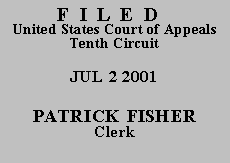

| UNITED STATES OF AMERICA,
vs.
LEEROY SEALEY |
|
Mr. Sealey's § 2255 motion was premised on two allegations: (1) that his attorney failed to appeal his sentence despite Mr. Sealey's request to do so upon discovering that the amount of drugs used to calculate his offense level included 500 grams of cocaine base in his possession in 1996, and (2) that his plea was made involuntarily because his attorney told him at the plea hearing that the applicable sentence was ten-years to life imprisonment, when in fact it was zero to twenty-years imprisonment. The district court denied Mr. Sealey's motion as procedurally barred, id. doc. 68, but did not determine whether a certificate of appealability ("COA") was appropriate. We consider Mr. Sealey's appeal as if a COA was denied. United States v. Kennedy, 225 F.3d 1187, 1193 n.3 (10th Cir. 2000) (citing Emergency General Order of October 1, 1996).
A COA should issue only if Mr. Sealey has "made a substantial showing of the denial of a constitutional right." 28 U.S.C. § 2253(c)(2). We have reviewed Mr. Sealey's COA application and brief,(1) the legal rulings in district court's order de novo, Kennedy, 225 F.3d at 1193, and the record. Having done so, we adopt the district court's analysis and hold that Mr. Sealey has failed to make the requisite showing of a denial of a constitutional right. Mr. Sealey did not receive ineffective assistance of counsel, see Strickland v. Washington, 466 U.S. 668, 687 (1984), and therefore cannot prevail upon a substantive claim on that theory, nor show cause for his failure to appeal his sentence. United States v. Cook, 997 F.2d 1312, 1320 (10th Cir. 1993). At the time of Mr. Sealey's plea hearing, his attorney's calculation of the applicable statutory sentencing range was in accordance with our precedent. See United States v. Reyes, 40 F.3d 1148, 1150-51 (10th Cir. 1994), abrogated by United States v. Santos, 195 F.3d 549, 552-53 (10th Cir. 1999), abrogated on other grounds by United States v. Jones, 235 F.3d 1231 (10th Cir. 2000). At sentencing, Mr. Sealey was aware that he could be sentenced to no more than twenty years. II R. at 9-11. He also knew that his sentence included his 1996 possession of 500 grams of cocaine base and knowingly and voluntarily waived any objection to drug amounts. I R. doc. 41, at 3 (objecting to inclusion of drug amount); II R. at 9 (waiving objection). Furthermore, Mr. Sealey knowingly and voluntarily waived his right to appeal twice, both on the record. Id. at 11, 20-21. His allegation that he asked his attorney to appeal eight days later is controverted by his attorney's sworn statement. I R. doc. 67, Wells aff. at 2. Regardless, the issue Mr. Sealey seeks to raise is meritless.
We GRANT IFP status, DENY the motion for appointment of counsel, DENY a COA, and DISMISS the appeal.
Entered for the Court
Paul J. Kelly, Jr.
Circuit Judge
*. This order and judgment is not binding precedent, except under the doctrines of law of the case, res judicata, and collateral estoppel. This court generally disfavors the citation of orders and judgments; nevertheless, an order and judgment may be cited under the terms and conditions of 10th Cir. R. 36.3.
**. After examining the briefs and the appellate record, this three-judge panel has determined unanimously that oral argument would not be of material assistance in the determination of this appeal. See Fed. R. App. P. 34(a); 10th Cir. R. 34.1 (G). The cause is therefore ordered submitted without oral argument.
1. Mr. Sealey's application and brief raise several new issues not presented to the district court. We decline to consider those issues in this appeal. Walker v. Mather (In re Walker), 959 F.2d 894, 896 (10th Cir. 1992).